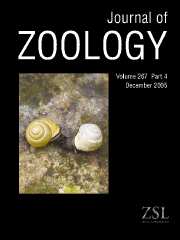Article contents
Metabolic responses to food deprivation in two limpets with different foraging regimes, revealed by recording of cardiac activity
Published online by Cambridge University Press: 18 December 2001
Abstract
The aim of this study was to investigate the effect of food deprivation on the cardiac activity of two Mediterranean limpets, the exploiter Patella caerulea and the conserver P. rustica, which have different foraging regimes. Heart rate variations were monitored in the two species according to two experimental protocols: (1) starvation/recovery, during which limpets were starved for up to 15 days and then allowed to feed on boulders covered with microalgae; (2) starvation/forced feeding, during which specimens were starved for 11 days and then fed orally with a test (30 mg/ml glucose) or control solution. Increasing starvation time was associated with a significant decline of heartbeat frequency in both species. The decline was comparable in the two species, but heartbeat frequencies in P. rustica were always significantly lower than in P. caerulea. When the limpets were allowed to feed on natural substrates, a rapid increase in heart rate was observed, with frequencies slightly higher than those measured at the beginning of the experiment. No significant difference in heart rate was observed between the two species. Similarly, both in P. caerulea and P. rustica forced feeding caused a recovery of heart rate to pre-treatment levels. The results are consistent with previous findings on the metabolic consequences of food deprivation in gastropods and demonstrate the ability of both species to depress their heart rate when faced with a food shortage. Moreover, a greater regulative ability was observed in P. rustica than in P. caerulea, confirming their status as conserver and exploiter, respectively.
Information
- Type
- Research Article
- Information
- Copyright
- © 2002 The Zoological Society of London
- 6
- Cited by

